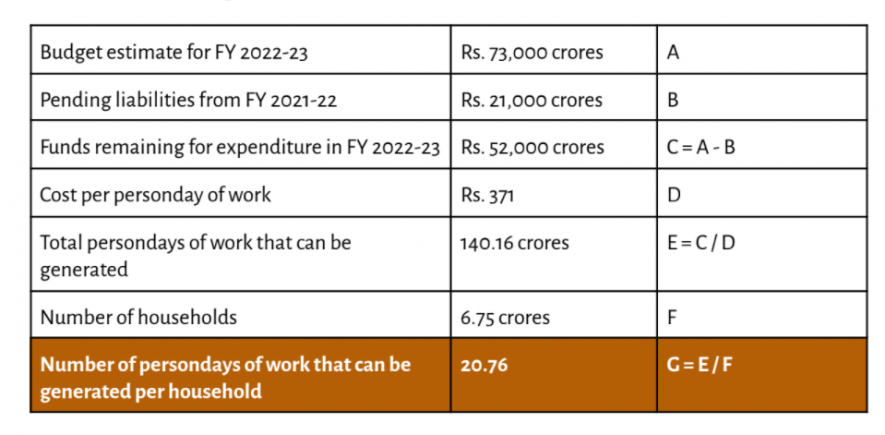Budget Allocation for MNREGA Not Enough, Say Experts
Representational use only.
People’s Action for Employment Guarantee (PAEG), in its pre-budget statement, had estimated that at least Rs 2.64 lakh crore would have to be allocated for NREGA in FY 2022-23 if 100 days of work are to be provided to the number of households that were employed in FY 2021-22, at a wage rate equal to Rs 269. PAEG also estimated that FY 2021-22 would end with over Rs 21,000 crore pending liabilities.
Close to the Act’s 16th anniversary, the Finance Minister, in her budget speech, announced that the budget estimate for NREGA in FY 2022-23 would be only Rs 73,000 crore. PAEG’s post-budget statement estimates that only 21 person-days of work can be generated per household with this amount.
The Mahatma Gandhi National Rural Employment Guarantee Act (NREGA) is a lifeline for millions of rural poor in India. It guarantees 100 days of employment for each household at minimum wages and is especially crucial in times of rural economic distress.
Since 2015-16, the annual budget allocation has never been sufficient to provide work to all those seeking employment under the program. PAEG said in a statement released on Thursday, February 10, “Every year about 80-90% of the budget gets exhausted within the first six months, resulting in a heavy slowdown of work on the ground. The government has not been able to provide employment to all active job card holding families due to inadequate budget allocation.”
NREGA Sangharsh Morcha (NSM), in its pre-budget statement, recommended that no less than Rs 3.62 lakh crore will be needed to ensure maximum employment generation for all active job card holding families.
“Out of the current budget allocation, about Rs 18,350 crore are pending liabilities from previous years. Therefore, only about Rs 54,650 crore is available for next year. If the government wants to provide a legal guarantee of work to all the active job card holding households, which is 9.94 crore, then considering the current budgetary estimate, it will only be able to provide some 16 days at per person per day average cost of Rs 334,” said the statement released by PAEG.
Table: Estimating the Numbers of Persondays of Work that can be Generated per Household with the Budget Allocated in FY 2022-23.

In a statement released earlier this month, on February 2, NSM had said, "We have recommended in our pre-budget note that no less than Rs 3.62 lakh crore will be needed to ensure maximum employment generation for all active job card holding families. The government has once again failed millions of its rural citizens who depend on the rural employment guarantee programme for meeting their life needs. We, members of NREGA Sangharsh Morcha, express our deep disappointment at this ridiculously low budget allocation for NREGA, and we urge that the central government should take necessary actions within a month to allocate adequate funds for the programme."
PAEG highlighted that while the Union government may argue that the Rs 73,000 crore is only the budget estimate and it may be revised as per requirement, the problem with an inadequate budget allocation is that the lack of funds with state governments leads to the initiation of a lesser number of projects, and thereby, lower generation of work on the one hand, and delayed payments from the centre on the other.
"Consequently, workers may be denied work. Even in FY 2021-22, around 83 lakh, or 11% of households that demanded work, were not employed, according to the government's own data," the organisation said in its post-budget statement.
It added, "An important point to note is that these figures are on the conservative side. Actual unmet demand will be much higher because of demand suppression at the source. Though the government claims that adequate additional funds will be allocated, it has not been the case historically. In FY 2020-21 and FY 2021-22, the additional funds allocated by the government have proven to be insufficient. On the other hand, demand for NREGA work continues to be high, and 1.99 crore wage transactions amounting to Rs 3,273 crore in wages have been delayed beyond the stipulated 15 days within which wages have to be paid, as on January 31, 2022."
Get the latest reports & analysis with people's perspective on Protests, movements & deep analytical videos, discussions of the current affairs in your Telegram app. Subscribe to NewsClick's Telegram channel & get Real-Time updates on stories, as they get published on our website.














